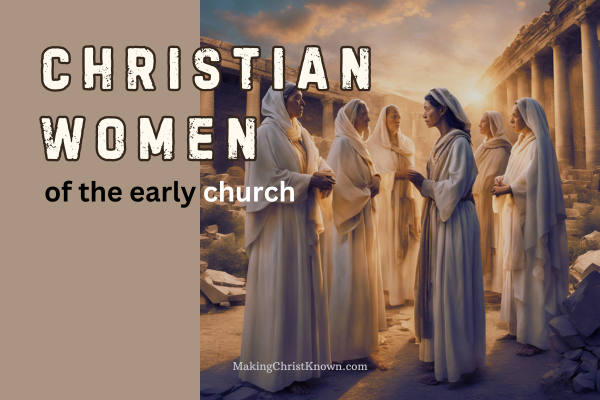Women in the Early Christian Church: Their Influence and Roles
The early Christian church spread rapidly across the Roman Empire. And, many influential women taught as well as the male apostles. Ultimately, these women played vital roles as
- leaders,
- teachers,
- and supporters.
They helped shape Christianity’s growth and development. Today, we’ll see the stories of Phoebe, Priscilla, and other women. Evidence shows these powerful women greatly contributed to the church’s success. So, let’s read on..
Phoebe: A Leader and Messenger
Phoebe stands out as one of the most significant women in early Christianity. Paul calls her a diakonos (deacon) in Romans 16:1-2, showing she was a leader in her church in Cenchreae, a port near Corinth. As a deacon, Phoebe had authority and responsibility.
Paul trusted her to deliver his letter to the Romans, one of the most important writings in Christian history. This task shows she was not just a messenger but an interpreter and guide. Phoebe’s work ensured that Paul’s teachings reached and were understood by Christians in Rome. Her role as a leader and communicator was vital for spreading the early church’s message.
Priscilla: A Teacher and Partner in Ministry
Priscilla, along with her husband Aquila, played a significant role in the early church. The New Testament mentions Priscilla more often than her husband. It emphasizes her prominent role. In Acts 18:24-26, Priscilla and Aquila teach Apollos, a preacher who needed theological help. They took him aside and explained “the way of God more adequately.” Priscilla’s teaching shows her knowledge. And she gained respect in her faith.
The Ministry of Priscilla
Priscilla and Aquila hosted a house church in Ephesus, creating a space for believers to gather and worship. Their ministry helped spread Christianity in key cities. Priscilla’s influence challenges the view that only men taught in the early church.
Lydia: A Supporter and Patron
Lydia’s story, found in Acts 16:14-15, underscores the significant financial and material support that women provided to the early church. As a successful seller of purple cloth—an esteemed and costly item in the ancient world—Lydia was a woman of means and influence. Upon meeting Paul in Philippi, she and her household were baptized, marking the beginning of her active role in the Christian community. Almost immediately, she offered her home as a meeting place for believers, creating a space for fellowship and worship.
The European Connection
However, Lydia’s contributions extended beyond merely opening her home. By leveraging her resources to support Paul and the early church, she became a key figure in the spread of Christianity throughout Europe. Her story serves as a powerful reminder that women were not only vital patrons but also influential supporters of the faith. Through their generosity and dedication, these women laid both the physical and spiritual foundations that sustained and grew the church.
Mary Magdalene: The First Witness
Mary Magdalene played an awesome role in Christianity. Found in the Easter story, she saw the risen Christ first. Then, she shared the news with others. In John 20:11-18, Mary stands at the tomb and encounters Jesus after His resurrection. He tells her, “Go to my brothers and say to them, ‘I am ascending to my Father and your Father, to my God and your God.’”
Mary Magdalene’s role as the first witness to the resurrection earned her the title “apostle to the apostles.” Her testimony confirmed the cornerstone of the Christian faith, Jesus’ resurrection. Despite the challenges of her time, Mary proved that women were essential to the church’s foundation.
Other Influential Christian Women
Other women also contributed significantly to the church. Romans 16:7 mentions Junia. The verse calls her “outstanding among the apostles.” This suggests she may have even held an apostolic role. Other women include:
- Tryphena,
- Tryphosa,
- and Persis.
They worked hard in Romans 16:12. These names show that women were active in ministry and service, even if their stories were less publicized.
Christian Women’s Lasting Legacy
Women’s influence on the early Christian church was undeniable. From Phoebe’s leadership and teachings to Lydia’s support and Mary Magdalene’s witness, each of these women played an essential role in the church’s growth. Their stories serve as powerful reminders of the dedication and faithfulness of both men and women that built the early church. Moreover, their unwavering commitment laid the groundwork for Christianity’s expansion across the Roman Empire.
As a result, the contributions of influential women set a precedent and inspired future generations to continue their work. Recognizing the significant roles these women played underscores the importance of their leadership, hospitality, and teaching. From them, we gain a deeper understanding of the Christian faith and its history. Christian women like Phoebe, Lydia, and Mary Magdalene remind us that the early church was enriched by their courage, resilience, and devotion. In this way, these women have left us a legacy of strength and courage that continues to inspire us today.
Discover more from Making Christ Known
Subscribe to get the latest posts sent to your email.
